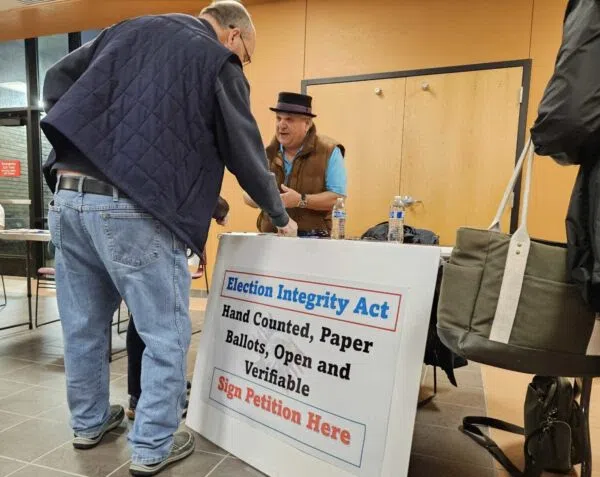
Charles Tuttle gathers petition signatures in Feb. 8, 2024 in Fargo (ND Monitor)
BISMARCK, N.D. (North Dakota Monitor) – North Dakota’s top election official says a citizen-led effort to change election rules “does nothing to secure our election; it does the exact opposite.”
Secretary of State Michael Howe was referring to a proposed initiated measure that requires hand-counting of paper ballots, eliminates early voting by mail and allows any U.S. citizen to examine the ballots after the election.
“People of North Dakota have every right to petition for whatever they want, and I think that’s a good process, but I fail to see what’s wrong about our election process here and need a complete overhaul like the one they have proposed,” Howe said.
Highlights of the proposed election reform measure include:
Ballots must be counted by hand.
No early voting or voting by mail, except for absentee ballots.
All precincts would need to be open on Election Day.
No drop-boxes for ballots.
Any U.S. citizen could request to audit the ballots.
It would become more difficult for the Legislature to put a constitutional amendment on the ballot. Each house would have to approve the amendment with a two-thirds majority vote instead of a simple majority.
It would become easier to petition for a recall election of an official.
Ranked-choice voting would be prohibited.
Full measure here
Supporters of what they are calling the Election Integrity Act are gathering signatures on petitions to get the measure on the November general election ballot.
The sponsoring committee needs to submit at least 31,164 signatures by July 8 to the Secretary of State’s Office.
Lydia Gessele, the chair of the sponsoring committee, says she saw problems as an election judge in Wells County – an assertion the Wells County auditor strongly denies.
“There are a lot of errors that need to be corrected in order for us to have real elections again,” Gessele said.
Among the people on the election reform sponsoring committee are independent candidate for governor Michael Coachman, state Sen. Jeff Magrum, R-Hazelton, and state Rep. Lori Van Winkle, R-Minot.
Gessele recalls a test run on the ballot counting machines for the 2022 election.
“I saw major problems with the machines when they did a test run before the November election when they had to continue to keep running these ballots through until they got the right total,” Gessele said. “Well, if the machines can tabulate properly, that shouldn’t have to be done.”
Dan Stutlien is the Wells County auditor who was in charge of the 2022 election in that county.
“That would be 100% false,” Stutlien said of Gessele’s accusation that voting tabulators didn’t work properly.
He accused Gessele of “fear-mongering.”
Stutlien said one aspect of the election reform measure, that auditors be elected, was aimed at him, because he was appointed to his position.
The 2022 election was Stutlien’s first as an auditor. He said the election process is “way more sophisticated than I thought.”
“The safeguards are impressive,” he said.
Howe, a Republican, said those safeguards would be weakened if the measure were to become law.
He pointed to Section 20 of the wide-ranging measure that would allow any U.S. citizen to audit North Dakota’s paper ballots.
“That would create huge problems,” he said. “Someone living in New Mexico could ask for access to every ballot that was cast, and say ‘I want to do my own audit.’”
He said current rules put the paper ballots under the control of the county recorder for 22 months after the election and they can only be accessed through a court order.
He emphasized that the ballot-counting machines are not connected to the internet.
One of the main points of the proposed measure is to return to hand-counting ballots.
Gessele said she has been talking with people in Missouri where some counties hand-count and thinks it can work in North Dakota.
Stutlien said it might be possible in rural counties like Wells, which has about 4,000 people with Fessenden as the county seat.
“It could certainly have the chance to be every bit as accurate, but it isn’t going to be more accurate than the machines and it’s going to take a hell of a lot longer,” he said.
What takes a machine minutes could take hours with hand-counting, he said. Gessele said a four-person team could count 75 ballots an hour, and possibly more and might be able to start counting before polls close.
A December vote in Fargo on potential improvements to the Fargodome used hand-counting of nearly 8,000 ballots and reported results the same day.
A flag inside the Fargodome helps direct voters casting ballots in a 2023 vote on a Fargodome improvement sales tax. (Jeff Beach/North Dakota Monitor)
Howe said even though it was a simple yes-or-no vote on one issue, “it still took a lot of time to count that few ballots,” he said
But a general election ballot with about 40 items on the ballot, some with options of voting for more than one candidate, would be “extremely labor intensive,” he said.
“Getting the results in a timely manner will not happen and the chance of human error increases as well,” Howe said.
Other areas of the proposed measure that Howe cited as problematic were that a hand-count could not be stopped until it is done, no matter how long that takes, and limiting voting options by banning early voting and mail-in voting.
The measure also would eliminate touch-screen voting, which he said is required by federal law to accommodate people with disabilities. He said the touch screens still print out a paper ballot as required by North Dakota law.
He pointed to a state auditor’s election security assessment of North Dakota elections that cites using paper ballots as a key security measure.
The auditor identified six low-risk vulnerabilities.
“The determination after extensive review from our contractor was that our election systems are incredibly secure across our state,” State Auditor Josh Gallion said in an October 2022 news release.
Howe said even though he feels the reforms aren’t necessary, any review of the petition will follow the same process as other petitions.
“We have to follow the state law,” he said.




Comments